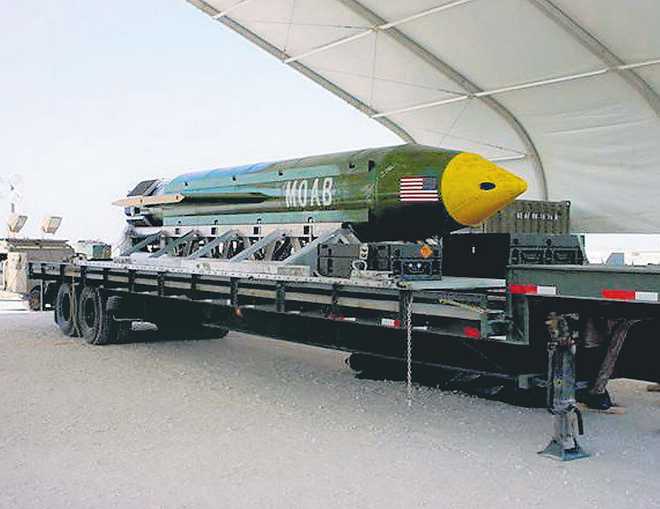
Militant caves in Afghanistan targeted
GBU-43 bomb used for the first time in combat
WASHINGTON (TIP): The United States dropped a massive GBU-43 bomb, the largest non-nuclear bomb it has ever used in combat, in eastern Afghanistan on Thursday, April 13, against a series of caves used by Islamic State militants, the military said.
It was the first time the United States has used this size of bomb in a conflict. It was dropped from a MC-130 aircraft in the Achin district of Nangarhar province, close to the border with Pakistan, a Pentagon spokesman said.
Also known as the “mother of all bombs,” the GBU-43 is a 21,600 pound (9,797 kg) GPS-guided munition and was first tested in March 2003, just days before the start of the Iraq war. The security situation in Afghanistan remains precarious, with a number of militant groups trying to claim territory more than 15 years after the US invasion which toppled the Taliban government.
General John Nicholson, the head of US and international forces in Afghanistan, said the bomb was used against caves and bunkers housing fighters of the Islamic State in Afghanistan, also known as ISIS-K. It was not immediately clear how much damage the device did.
White House spokesman Sean Spicer opened his daily news briefing speaking about the use of the bomb and said, “We targeted a system of tunnels and caves that IS fighters used to move around freely, making it easier for them to target US military advisers and Afghan forces in the area.”
Last week, a US soldier was killed in the same district as the bomb was dropped while conducting operations against Islamic State. “The United States takes the fight against ISIS very seriously and in order to defeat the group, we must deny them operational space, which we did,” Spicer said.
He said the bomb was used at around 7 p.m. local time and described the device as “a large, powerful and accurately delivered weapon.” The United States took “all precautions necessary to prevent civilian casualties and collateral damage,” he said.
US officials say intelligence suggests Islamic State is based overwhelmingly in Nangarhar and neighboring Kunar province.
Estimates of its strength in Afghanistan vary. US officials have said they believe the movement has only 700 fighters but Afghan officials estimate it has about 1,500.
Islamic State’s offshoot in Afghanistan is suspected of carrying out several attacks on minority Shi’ite Muslim targets. The Afghan Taliban, which is trying to overthrow the U.S.-backed government in Kabul, are fiercely opposed to Islamic State and the two group have clashed as they seek to expand territory and influence.
Efforts to dismantle ISIS strongholds have been concentrated in Iraq and Syria. But a small stronghold of fighters made up of former Taliban members has grown in eastern Afghanistan since 2014. The group is known as Islamic State Khorasan, according to a U.S. Institute for Peace report released in November.
“IS-K receives funding from the Islamic State’s Central Command and is in contact with leadership in Iraq and Syria, but the setup and day-to-day operations of the Khorasan province have been less closely controlled than other Islamic State branches such as that in Libya,” the report notes.
President Donald Trump lauded the strike on Thursday, calling it “another very, very successful mission.” Just last week, he also approved a strike on a Syrian air base in the aftermath of a chemical weapon attack on Syrian civilians that killed almost 100 people.
Trump, while advocating for a lessened U.S. role in international conflicts, also claimed he would “bomb the shit” out of the Islamic State during his presidential campaign.
There is an anxious concern on US plans about North Korea. In view of the bombings carried out in Syria and Afghanistan, there is concern that US may translate its warning given by Nikki Haley, its ambassador to the UN that if the World Body failed to act against North Korea, US will act against the “rogue regime” on its own. And, quite obviously, member nations are concerned about the consequences of a US strike against North Korea.





Be the first to comment